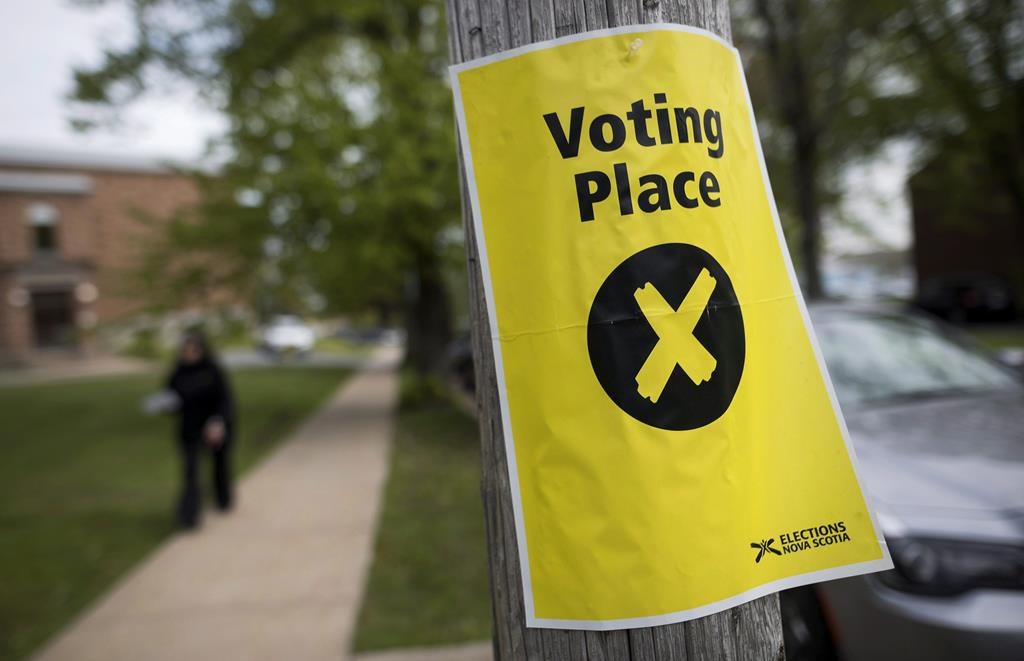Voters in the rural Nova Scotia provincial electoral district of Pictou West are ready to go to the polls Tuesday in a riding that voted decisively Tory in the 2021 provincial election.

The riding borders another held by Premier Tim Houston, who quickly called the byelection for May 21 following last month’s surprise retirement of the legislature’s Speaker, Karla MacFarlane.
MacFarlane had held the riding, which includes the town of Pictou, N.S., since 2013 and easily retained the seat for the Progressive Conservatives in the 2021 general election by taking nearly 64 per cent of the vote.
Houston, who had six months to call the byelection, did so on April 21, a little over two weeks after MacFarlane announced her decision.
Lori Turnbull, a political scientist at Dalhousie University, believes the speed of the premier’s call is an indication the governing Tories are confident about their standing in a riding where they are running a newcomer to politics, Marco MacLeod.
“They went with a neophyte and they were comfortable doing that,” said Turnbull.
MacLeod, who runs a small custom lumber mill on his family farm, said he was conscious of the need to establish his own presence despite his party’s perceived strength.

Get daily National news
“I’m a fresh face here, so I’m not taking anything for granted and we’ve been putting a lot of energy into reaching all corners of the riding,” he said in an interview last week. “I’m not a huge social media guy, I prefer going on doorsteps and having conversations with people.”
Also vying for the seat are Liberal candidate Mary Wooldridge-Elliott, who finished a distant second to MacFarlane in 2021, the NDP’s Melinda MacKenzie and Clare Brett, who also ran in 2021 for the Green Party of Nova Scotia.
Wooldridge-Elliott, who is a school bus driver and member of Pictou County council, and MacKenzie, who is a school teacher and a member of Pictou town council, believe they have a fighting chance because of their political experience at the local level.
“I couldn’t imagine what (campaigning) would be like if I hadn’t had the experience,” said MacKenzie. She added that she’s a good option for voters who want closer links between municipal and provincial issues.
Wooldridge-Elliott makes a similar pitch.
“I can bring to the table what I’ve learned as a municipal councillor,” she said.
The candidates all said the state of the province’s health care system and the cost of living are the main issues voters have been raising during the campaign.
“I think food and shelter are the two biggest things that everybody is dealing with right now,” said Brett, a singer-songwriter and caregiver who moved to Nova Scotia from B.C., six years ago and felt compelled to run for the Greens in order to provide voters with an alternative to the three major parties.
Meanwhile, Turnbull said observers would be surprised if the riding doesn’t stay in the hands of the Progressive Conservatives. As a result, she said it won’t serve as an indicator of the government’s strength heading into a provincial election that must be called no later than July 15 of next year.
“I don’t think Houston is going to an election early,” Turnbull said. “So whoever wins this (byelection) is going to be in the seat for close to a year.”
Heading into Tuesday’s vote the Tories hold 32 seats in the 55 seat legislature, while the Liberals hold 15, the NDP has six seats and there is one Independent.
This report by The Canadian Press was first published May 19, 2024.







Comments